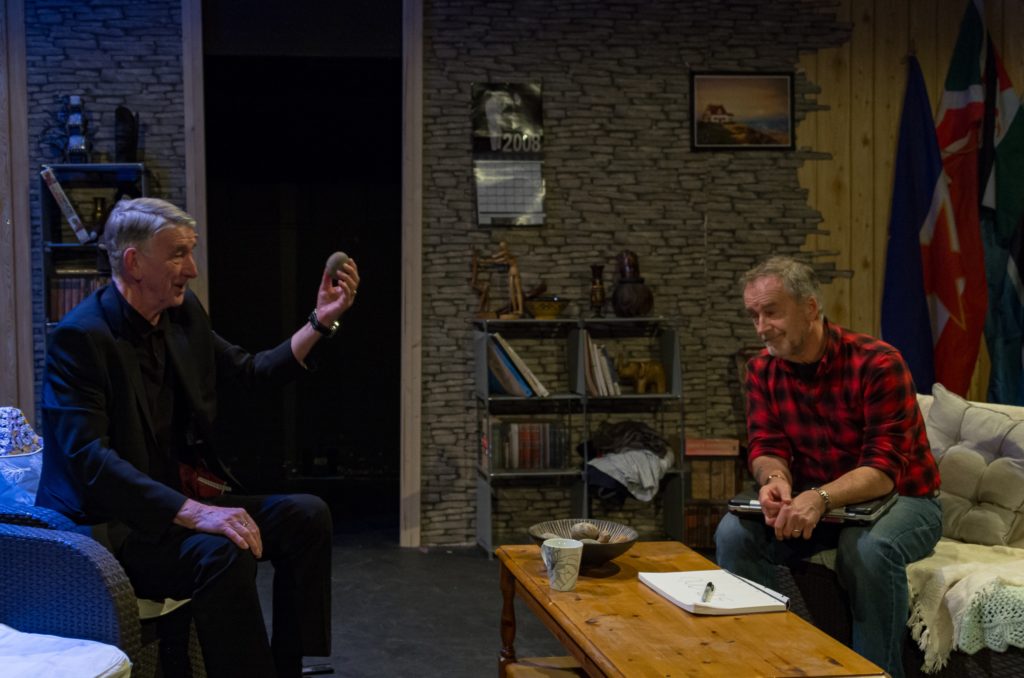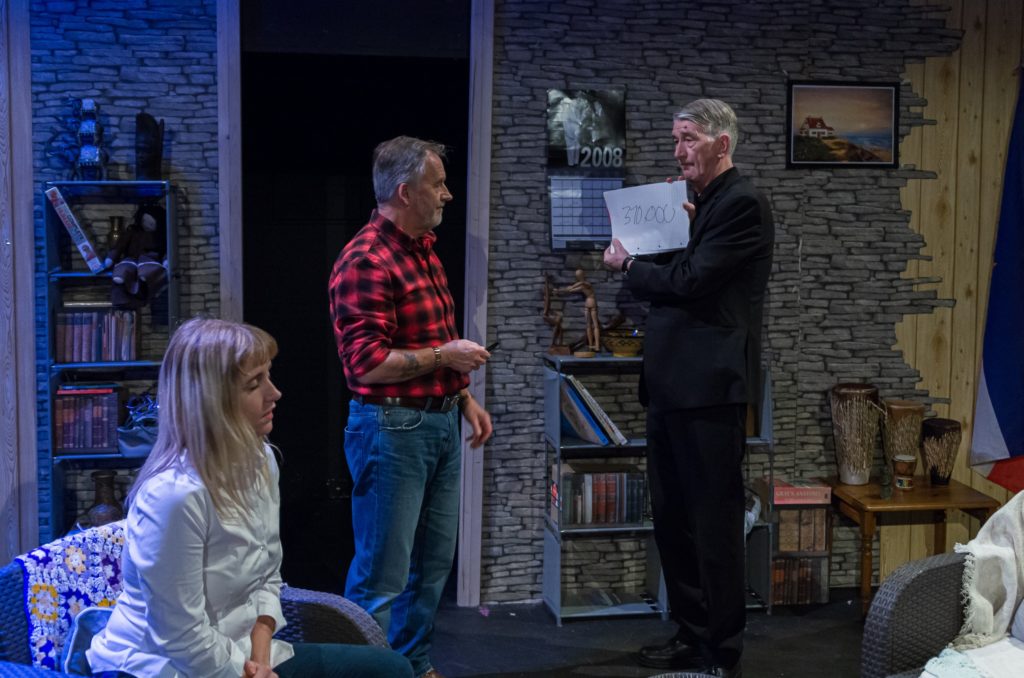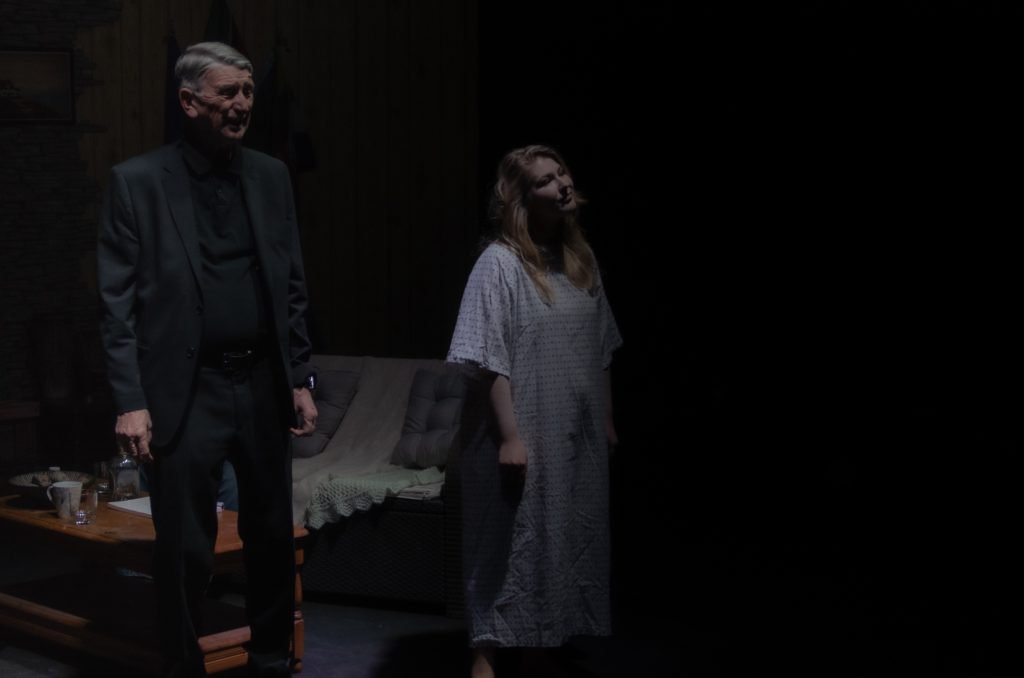
“SOMETIMES we touch, connect, brough together by the tide. Sometimes we grind each other into sand like millstones. Sometimes we just break apart.”
York writer Tim Murgatroyd, eight novels to his name, and now penning his debut play, likes a metaphor. First-time stage director Martin Handsley loves the sound of the sea, and so the crashing of waves will greet this week’s audiences and accompany scenes staged at a lonely, low-key cottage by the coast, where Phil Goodman (Mick Liversidge) has retired after working as a doctor in conflict zones such as Rwanda and Yugoslavia.
In a play about relationships between fathers and daughters, we first encounter Jana Ilich (Ukrainian-born mezzo-soprano and actress Polina Bielova) and her “businessman” father Ratko (Ian Giles).
The year is 2000, ten years after the Yugoslavian Civil War; Jana is a lawyer, determined to prepare war trial prosecutions. Her father, who has more than something of the night about him, is always away on business overseas. He demands she should stop compiling her evidence; she will not be told.
Subsequently Jana will appear very briefly in Goodman’s cottage, without being seen by him and without naturalistic explanation, a moment of intrigue that establishes her presence but puzzles at the same time, until the narrative black hole is filled in later.
Liversidge’s Goodman is looking in his mirror; he appears to have a blood pressure kit around his arm, but again with no elaboration from Murgatroyd’s script. Maybe a daily routine, maybe later explained by the revelation that he is a former doctor, but such a prop is a mere distraction if not used.

Suddenly, Phil’s long-absent daughter, Sophie (Raqhael Harte), arrives. They have not seen each for more than four years; she was brought up by her mother and stepfather (who she calls ‘daddy’ on the phone) since her parents’ split, which may explain her Scottish accent, as opposed to Phil’s north-eastern brogue.
Sophie is brusque, nervous, needs a bath, has chips on both shoulders, doesn’t want to talk, but will have to. She may drive a swish Alfa Romeo – too flash for dad Phil – but she is in big trouble. The year is 2008, as denoted by the large numerals on the calendar on the wall, the year when the banks crashed, and, spoiler alert, Sophie has hit the rocks over her hedge fund-dealing.
Phil may be as good a man as his surname would indicate, but not so in the eyes of his daughter, who still resents him from his absence in childhood days.
Here we have two head-strong daughters whose relationships with their fathers come from the Lear and Cordelia playbook. Stones in the sea that grind each other into sand, but can they learn to touch, to connect, to re-connect?
Would it surprise you to learn that Ratko’s dodgy business dealings (prostitution etc) have brought him into connection with Sophie? Enter Ratko and his heavies, two staying in the car, one out back, as he demands money owed by Sophie.
Cue a long, restless night of confrontation and negotiation, suspense and surprise, truths and lies, revelation and even redemption amid further appearances by Bielova’s spectral Jana. This is a reckoning of good deeds versus bad deeds, of the seeds of greed and the lure of corruption versus the human capacity for helping others rather than helping yourself to others’ goods. Compassion versus contempt too.

Catching Monday afternoon’s dress rehearsal revealed a cast adept at building tension and intense, difficult relationships, matched by Murgatroyd’s ear for dialogue and astute perception of human complexities and contradictions.
The staging, however, worked against these attributes. The regular sight of the stage team taking the cottage furniture on and off and pulling the black-box curtain across the stage for scenes in Yugoslavia or by the sea broke the rhythm, a clunky manoeuvre that would have been eased by keeping the furniture in place and placing a curtain in front.
Since the dress rehearsal, music has been introduced to accompany the scene changes, but any re-staging of Sea Stones would require a design re-think.
Music already plays its part at the opening to the second half, Bielova parading her mezzo-soprano chops with haunting beauty to herald further troubles afoot.
A play for today drawn from recent yesterdays, Sea Stones marks a promising start for the Murgatroyd and Handsley partnership for York company Lumar Productions. Murgatroyd is already writing a second play, and Handsley has been bitten by the theatre bug, with a feel for the geometry and chemistry of staging scenes. Be assured he will furnish his next production with more finesse and less fiddling with furniture.
Further performances: 7.30pm tonight and tomorrow; 2.30pm and 7.30pm, Saturday. Box office: tickets.41monkgate.co.uk.
